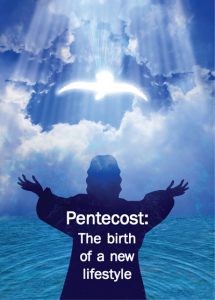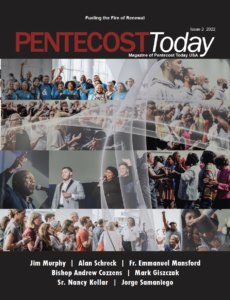On the occasion of the historic presence of Pope Francis at the 37th Convocation of the Renewal at the Olympic Stadium of Rome, on June 1, 2014, the “project of new life” for the Catholic Charismatic Renewal Movement was written by the Holy Spirit in the hearts of our “ecclesial family.”
The words of the Holy Father, pronounced before 52,000 convened at the stadium and the press of the entire world, tell us how much the Pope “counts” on the Renewal, sharing its “identity and mission.” And, at the same time, how “demanding” is the request for coherence and faithfulness to the plan of the Holy Spirit, in a special way, in the life of the leaders of the Renewal.
The Pontificate of Francis is together both kerygmatic and charismatic as never before in the history of the Church. Only those who are hard of heart and the distracted do not comprehend that at the heart of the Church there is a people, the Renewal, which serves the Lord and wants to make itself a gift for the world. A people who serves with joy and is at the service of the joy of God (the least in the Kingdom) to gift the joy of God (salvation to all men) as requested by Francis himself to the whole Church in his Apostolic Exhortation Evangelii Gaudium. With Pope Francis the Church is living a kairós of the Spirit, a favorable time, a new season of love for the person of Jesus professed in a vital way, not just as a ritual, as Lord and Savior. And in many, especially among those who were on the borders of faith or who were living a dead (dying) faith, interest for the Gospel and for the Church is reawakening. We cannot help but note the fact that the enthusiasm aroused by Francis is truly without precedent, so that many are crying out to a “miracle of Pentecost,” to the wonder of a faith which is returning to affirm itself with kerygmatic and charismatic flavor as at the time of the first Christian communities.
The worldwide Charismatic Renewal is on the threshold of its “Golden Jubilee” and we reiterate with conviction: the Renewal is “needed”! It is “necessary for history” that it exists; and “it serves history” as well because human history is always marked by the living presence of Jesus in the power of the Holy Spirit. It is necessary that “the quality” of our love for Jesus is tangible in order to invoke the Renewal as a “current of grace,” as Pope Francis has stated in the Olympic Stadium. He called for “quality love” among us, rather than quantity. Therefore it is necessary that our hearts be a “river” of love of the Spirit and not a “lake.” Often our hearts are artificial, represented by actions, decisions and works without love, carried out without sentiments of the heart; with prayers that do not touch the heart because they are without a soul, without praise that springs from life; closed lakes, without an “outlet” in the heart of history, in the hearts of brothers and sisters who we are called to serve rather than those to be “led” and “commanded.”
Outside of the love of the Spirit there is no humanity, no society, no family, no group, and no community. Away from Love nothing makes sense; one cannot find usefulness, harmony, beauty or fruit. The opposite of love is death. St. John reminds us: He who does not love remains in death (1Jn 3:14b). That is why the love of God is the greatest risk that God himself took when he decided to pitch his tent among us. If we love, he appears, and his love shines in us. Otherwise, God is far away, anonymous, inconsistent. It is only in this light that the Renewal can be seen, at all times and everywhere, as charismatic and missionary.
Francis “defines” what the Renewal is and “leads” it
It should not be forgotten how Pope Francis “defines the Renewal.” His teaching at the Olympic Stadium and taken up again in St. Peter’s Square must not be just thrown aside to sit on a book shelf but it must be taken up, read, studied and honored because a Pope has never participated for two years in a row at the Gathering of a Movement.
1. “You are born by the will of the Holy Spirit, as a current of grace in the Church and for the Church”.
He is calling us to our “identity” and “belonging”: it is from the “anointing” of the Spirit (grace) and not from the “functions” (role and services) that we must begin again, strengthening our submission to the person of the Holy Spirit and our communion in the Church.
2. “The Charismatic Renewal is a great strength at the service of the proclamation of the Gospel, in the joy of the Holy Spirit”.
This contains the sense of the “mission” and of “service” which we must give to the world. We are being called with the power of the charisms to spread the joy of meeting the person of Jesus in every place, to every person, especially to those far away and the suffering, not limiting ourselves to meeting him in the “community prayer time,” and letting the freedom of the Spirit win over every fear of being a “Church moving out.”
3. “Everything must be based on adoration! The foundation of the Renewal is to adore God!”
In this way our sense of the “Lordship of Jesus and of the authority of God” in our midst is reaffirmed. Adoration fights idolatry; adoration brings down pride which tempts us to want to excel over others; it is the fount of service and not of power; it quietens human reasoning because the desires and commands of God prevail.
4. “In the Malines Documents, you have a guide, sure guidelines so as not to take the wrong road.”
With the Malines documents (six in all, coordinated by Cardinal Leo J. Suenens between 1974 and 1986 and which he desired as theological-pastoral Guidelines of the Renewal), the Holy Father highlights the importance of “tradition” and of “formation” along our journey. Renewal is neither invented nor improvised! The history that precedes us is holy. The “prophecy” of the Renewal is always closely related with its “memory.” These two dimensions of the Spirit cannot contradict each other!
For a Culture of Pentecost
Addressing the Renewal of Italy in 2002, it was St. John Paul II who asked for the spreading of a Culture of Pentecost. Even today we feel that this mandate is alive and urgent.
The world has not yet received the universal brotherhood lesson of Pentecost; the theology that dominates still lacks the culture of the miracle of Pentecost; political and social systems still lack the dynamism of love of Pentecost. To us has been requested to gift to this new millennium the “Gospel of the Holy Spirit.” How many Christians seem to live their existence without the Holy Spirit, a “pre-pentecostal” existence!
Where there is fear, there is no Pentecost;
where there is indifference, there is no Pentecost;
where there is powerlessness, there is no Pentecost;
where there is disorientation, there is no Pentecost;
where there is confusion, there is no Pentecost;
where there is laziness, there is no Pentecost;
where there is individualism, there is no Pentecost!
For most Christians the Holy Spirit still remains unknown (Pope Leo XIII, 1897): very often he is a stranger to our religious culture, to the dominating cultural tendencies, to the catechetical and homiletics, to education in the areas of family and scholastic. At best, for most Christians, as affirmed by Pope Francis, the Holy Spirit is a luxury prisoner (May 9, 2016).
The Culture of Pentecost calls for those “devoted to the Spirit,” not “cultured” men and women who put God into a world of ideas and books. We need witnesses, who give citizenship to the Spirit, who are a reminder of the relevance of the Spirit and who do not desire notice other than to bring honor to God. The Culture of Pentecost is to be lived!
Pentecost gives birth to new men and women. A new “life style” is born, a new culture is born, which is spiritual in nature and it can neither be bought nor learned. It is something with which every person can experiment, so that they are able not only to resist evil, and to fight evil, but to defend good, to nourish good. At Pentecost true interior life of human history begins: Pentecost men and women learn “from within” what it means to live, to love, to suffer, and to lay down one’s life for that in which you believe.
The Culture of Pentecost is the definitive truth with regard to everyone, in light of the true power that God gives. It is the final redemption of the fundamental truths of God over every deceit, lie, and falsehood of the present times, without “delegating” to others one’s personal commitment to always make space for the miracle of the Holy Spirit in human life.
Since 1997, Salvatore Martinez has been the first lay person to lead Rinnovamento nello Spirito Santo (the Renewal in the Holy Spirit in Italy). He is also President of the Vatican Foundation “International Center Family of Nazareth,” for the development of the Magisterium of the Family in the world, with special mission to the Middle East. He is Consultor of three Pontifical Dicasteries: Laity; Family; and New Evangelization. Conference speaker in 35 countries on five continents on spiritual and social themes and to date has published 27 books.



 Click Here for us to pray for your intentions through our new website.
Click Here for us to pray for your intentions through our new website. 
